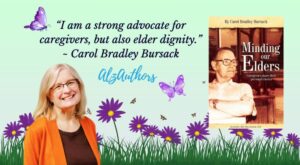Far Too Many People Still Attach a Stigma to Illnesses That Cause Dementia
Anyone who has cared for a disabled child or has a visible disability of their own knows this. However, people who care for an elder with dementia may have more difficulty coping with the stares of the public because the person they are caring for was once their dignified father or charismatic mother. The pain of seeing others stare, not knowing how this person was robbed of his or her cognitive abilities, has the potential to bring out the defensive protector that lies within each of us.
Dementia Constantly Throws Us Curveballs: In addition to this public pressure, when I used to take my father to his frequent doctor’s appointments at the local clinic, I was also faced with the challenge of not knowing which version of Dad I would be escorting.
Dad’s dementia descended, full-blown, overnight following a surgery. He was a dignified intellectual, who made it his life’s work to be considerate and caring to others. But now he was suddenly capable of becoming a spectacle at a moment’s notice. When Dad was sleepy and I was wheeling him into the clinic, he was basically ignored. I could take him to his appointments in the para-transit bus, they would wheel him off and I would be on my own with Dad in the clinic. A sleepy Dad was a quiet Dad, so he didn’t stir much interest.
Sometimes he was awake enough to know what we were doing, but those times were fairly low-key as well. Anyone paying attention could note issues, but those sideways looks came and went quickly.
On the other hand, when Dad was deep into one of his ultra-demented states, he did provide quite a show. A time I remember well was an instance when he was alert and happy as could be. This should have been a positive thing, but in that mode, he was loudly having a conversation with someone who was not there, in Spanish, his second language. He was waving to “his public” as if he was riding on a parade float. Of course, people stared. And the little brat in me wanted to yell, “He’s smarter than any of you! He can’t help this, so stop staring!”…
Continue reading on Agingcare for more about the stigma and how we, as caregivers handle it:
Minding Our Elders: Caregivers Share Their Personal Stories. Darlene Fuchs, Author of Get in the Boat”: Your shared stories are deeply moving and relatable, reflecting the varied emotions and challenges of caregiving for aging loved ones. “Minding Our Elders” serves as a poignant and invaluable resource, offering support and connection to caregivers on their journey.
Discover the Difference. EGOSAN: The premium incontinence brand caregivers love – Now Available on Amazon.








